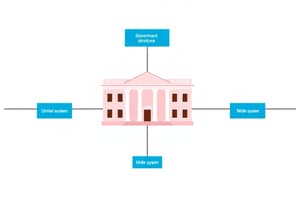Podcast
Questions and Answers
What type of government system has a strong national government with power derived from it?
What type of government system has a strong national government with power derived from it?
- Confederate system
- Dual federalism
- Unitary system (correct)
- Federal system
What is the definition of a Federal system?
What is the definition of a Federal system?
System of government where power is divided between a national government and state governments.
What does the Confederate system entail?
What does the Confederate system entail?
A system of government with a very weak central government and strong states.
What is meant by Grant-in-aid?
What is meant by Grant-in-aid?
What are Block grants?
What are Block grants?
What distinguishes Categorical grants?
What distinguishes Categorical grants?
What is a Revenue-sharing grant?
What is a Revenue-sharing grant?
Define Referendum.
Define Referendum.
What are Delegated Powers?
What are Delegated Powers?
What is the Supremacy clause?
What is the Supremacy clause?
What are Mandates?
What are Mandates?
Explain Cooperative federalism.
Explain Cooperative federalism.
What is Sovereignty?
What is Sovereignty?
What does the 10th amendment state?
What does the 10th amendment state?
Define Necessary and proper clause.
Define Necessary and proper clause.
What does Dual Federalism refer to?
What does Dual Federalism refer to?
What is an Initiative?
What is an Initiative?
Explain the Recall process.
Explain the Recall process.
What is the Full faith and credit clause?
What is the Full faith and credit clause?
What are Reserved Powers?
What are Reserved Powers?
What is the Commerce Clause?
What is the Commerce Clause?
What does Devolution refer to?
What does Devolution refer to?
Flashcards are hidden until you start studying
Study Notes
Federal Systems of Government
- Federal system: Power divided between national and state governments; exemplified by the USA with a national government and individual state governments.
- Confederate system: Weak central government, strong state control; originally seen in the 13 colonies under the Articles of Confederation.
- Unitary system: Local governments derive authority from a strong national government; seen in the UK, where regional parliaments are subordinate to the national Parliament.
Types of Grants
- Grant-in-aid: Federal funding to states for specific projects; e.g., Congress funding California to build railroads.
- Block grants: Broad-purpose grants with fewer restrictions; e.g., funding for various infrastructure projects in Florida.
- Categorical grants: Specific-purpose funds with strict spending guidelines; e.g., federal funding for educational resources like textbooks.
- Revenue-sharing grants: Unrestricted federal funds distributed to states based on formulas like GDP and population; e.g., equitable distribution among states.
Legislative Processes
- Referendum: Direct voter approval for proposed laws or amendments, allowing citizen participation in legislation.
- Initiative: Citizens' right to propose new laws or amendments, enabling grassroots legislative change.
- Recall: Voter process for removing elected officials from office based on performance or competency concerns.
Powers and Authorities
- Delegated Powers: Powers exclusively held by the national government, such as coining money.
- Supremacy clause: Establishes that the Constitution and federal laws override conflicting state laws within constitutional limits.
- Mandates: Required federal rules that states must follow regardless of funding.
- Sovereignty: Supreme political authority vested in the Constitution, ensuring federal supremacy.
Federalism and Governance
- Cooperative federalism: Collaboration between federal, state, and local governments, represented as "marble cake" federalism.
- Dual Federalism: Distinct separation of responsibilities for state and federal governments, exemplified by state control over intrastate commerce.
- Necessary and proper clause: Grants Congress the power to enact laws deemed necessary for fulfilling its duties, forming the basis for implied powers.
- Reserved Powers: Powers not granted to the national government, retained by the states, such as making laws regarding marriage.
- Commerce Clause: Grants Congress authority to regulate interstate commerce; significant in cases like Gibbons v. Ogden concerning river trade.
Evolution of Federalism
- Devolution (New Federalism): The transfer of responsibilities from the national government to the states, allowing for greater local autonomy and flexibility in fund allocation.
Studying That Suits You
Use AI to generate personalized quizzes and flashcards to suit your learning preferences.




